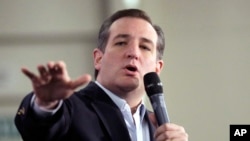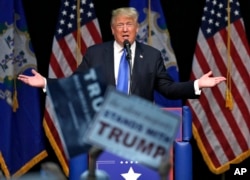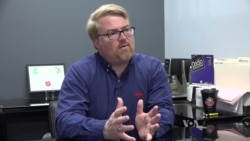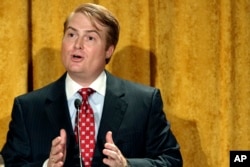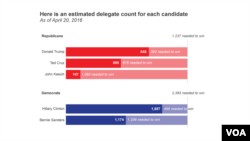Marc Scaringi wants Pennsylvania voters to know that a vote for him is a vote for Donald Trump.
The Harrisburg lawyer, political talk show host and Trump supporter is running for the important position of Republican party delegate.
“Pennsylvania has the chance to be a deal-maker,” Scaringi tells his audience as he tapes his political talk show on the Sunday before Primary Day. He’s broadcasting from a sound booth in a storefront radio station in the small city of Carlisle, Pennsylvania. The sense of anticipation statewide is clear as callers phone in rally reports and delegate campaign pitches during the hour-long show.
Pennsylvania has 71 Republican delegates, 17 of which are dedicated to the winner of the state contest, but the remaining 54 are not legally bound to choose the presidential candidate voters in their districts selected. These unbound delegates will head to the Republican Party convention in Cleveland this July completely free to support the candidate they – not the voters - choose.
Scaringi reminds his audience that contests this late in a close primary season don’t leave room for error. The 54 unbound Pennsylvania delegates could be the crucial votes sealing “a bid for Donald Trump or holding him short of the 1,237 (needed for the nomination) and keeping open the possibility of a stalemate convention where anything can happen,” Scaringi says. “So, Pennsylvania is just about the most critical state in this election cycle.”
Mini-campaign
The Pennsylvania system has one more twist. The ballot does not list how delegate candidates have pledged to vote at the convention. Voters may cast their votes for Donald Trump, but there’s nothing to guide them farther down the ballot when they choose delegates who could help Trump win the nomination.
Some of the delegate candidates – like Scaringi – announce their affiliations ahead of Primary Day, while other candidates believe it is their duty to vote according to the popular vote in their district.
The Trump and (Texas Senator Ted) Cruz campaigns are pushing hard to make sure the delegates already confirmed for their camps are elected, creating websites listing endorsed delegate candidates and printing cards to hand out to voters as they walk into polling locations.
Scaringi says he has done television and radio ads, Facebook and email blasts to educate voters on his preference.
“They’re little mini presidential campaigns,” he says.
During a commercial break in his talk show, an advertisement with a familiar name plays. Scaringi smiles behind the microphone as the advertisement encourages Pennsylvania 4th District voters to “Vote for Trump Delegate Marc Scaringi on Primary Day.”
A democratic process?
“It’s a quirky process; it’s unique in some ways to Pennsylvania,” said University of Georgia professor Josh Putnam, an expert in the delegate process.
Donald Trump often criticizes what he calls a “rigged” voting process. The Pennsylvania unbound delegate rule may appear to be one more way obscure party rules are obstructing the democratic process. But Trump supporter Scaringi says it makes sense.
“We elect congressmen. We elect senators. They go to Washington, DC. They vote whichever way they want to vote,” he says. “The same thing goes with our political parties.”
Even if the delegate candidates announce their preferences, there are no legal or electoral rules that keep them from changing their minds. Putnam says the state set up the unbound delegate system to favor local party officials.
Many voters take the time to educate themselves about the delegates. But if they don’t, they often end up picking a familiar political name when all else fails inside the voting booth.
A good contested convention?
One of those familiar names is Charlie Gerow.
His office - only a few blocks away from the state capitol - is filled with decades of political memorabilia: signed photographs from U.S. presidents, newspapers dating from the days of America’s Founding Fathers and souvenirs from 40 years of involvement in Republican conventions.
Gerow is competing on the same ballot with Marc Scaringi for a delegate spot in Cleveland. While Scaringi says he will vote for Trump on every round at the convention, Gerow says he will follow the will of the voters on the first ballot and then use his “judgment, integrity and experience” to make a choice on subsequent ballots. He will choose a candidate who can defeat (Democratic frontrunner) Hillary Clinton and carry on the legacy of his old boss, Republican President Ronald Reagan. He began his political career working on the Reagan campaign.
Gerow has been at every Republican convention since 1976, the last time the party held a convention without a clear nominee, but he thinks his experience might not be attractive to voters in an election year that has favored outsider candidates.
Gerow also says unbound delegates are a fair part of the primary process. “Conventions are parties choosing their nominees,” says Gerow. “It’s not an open democracy or even a representative democracy.”
Even after attending 10 conventions, Gerow says that if he is elected as a delegate, 2016 will be the most exciting convention of his lifetime.
“You’ve got a tremendous mix of candidates, interests, people of good faith that really want a united party,” he said. “For the first time, in my political lifetime, we – the Republicans - are not simply nominating the next guy in line and that’s a very positive thing. Conventions are supposed to work like this.




